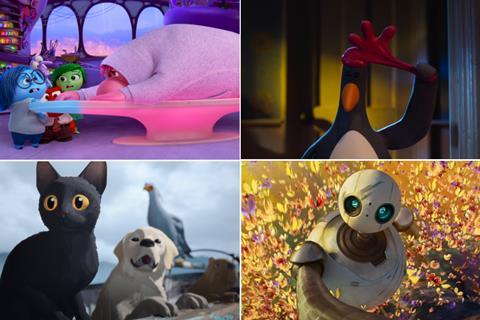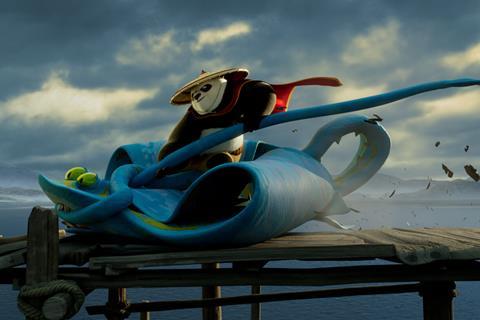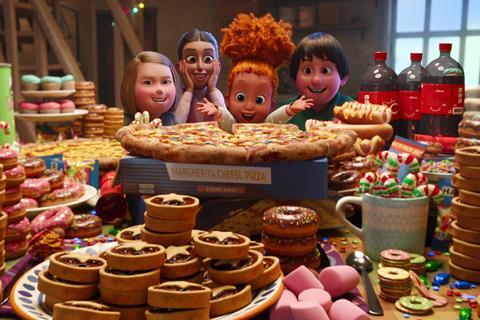Sequels, prequels, original stories… and even a silent film and a documentary. Screen assesses the diverse contenders competing for this year’s animated feature Oscar and Bafta.

Exactly a year ago, it appeared to many that Sony Pictures Animation’s Spider-Man: Across The Spider-Verse was the most likely contender to win the animated feature Oscar, repeating the feat achieved by Spider-Man: Into The Spider-Verse in 2019.
It was not to be. While nominated for best animated feature at Oscar and Bafta, Across The Spider-Verse lost at both ceremonies to Studio Ghibli’s The Boy And The Heron — a return to the director’s chair for Hayao Miyazaki, who had announced his retirement in 2013. It was the second Oscar win for Ghibli and Miyazaki, following Spirited Away’s animated feature triumph in 2003.
This year sees major studio titles face agile competition from indie contenders for the animated feature Oscar and Bafta. Making the early running, Pixar’s Inside Out 2 landed in June as a highly achieved sequel that also managed to save the summer box office after a slow start to the season. Global cinema takings of almost $1.7bn would be welcome at any time, but it was especially appreciated at that wobbly moment, and the total remains unmatched by any other film released in 2024. Kelsey Mann (story supervisor on a string of Pixar titles) makes his feature directing debut.
Pixar has won the animated feature Oscar 11 times since the category’s introduction for the 2002 awards, and eight times at Bafta since its reintroduction in 2007 — and Inside Out scooped both in 2016. Inside Out 2 is one of four animated sequels in the worldwide box office top 10 for 2024 — alongside Despicable Me 4 ($969m), Moana 2 ($901m) and Kung Fu Panda 4 ($548m).
Illumination/Universal’s Despicable Me 4 continues a box office hot streak for a franchise that now comprises six films (including two Minions features), and it might be assumed the series would have found consistent support from US and UK film academy voters. In reality, not so much. Out of the sextet, only Despicable Me 2 received an animated feature Oscar nomination. Bafta has proved more generous, nominating the first two Despicable Me films and Minions.
Disney’s own Walt Disney Animation Studios has won the animated feature Oscar four times and the Bafta twice, most recently in both cases with Encanto in 2022. Moana was nominated in 2017, losing the Oscar to Disney’s own Zootopia and the Bafta to Laika’s Kubo And The Two Strings, and the studio will be hoping for nominations again with Moana 2. David G Derrick Jr and Jason Hand, who both served as story artists on Moana, and Dana Ledoux Miller jointly make their feature directing debut on the film.

DreamWorks Animation’s Kung Fu Panda franchise earned animated feature Oscar nominations for the first two films in the series (in 2009 and 2012) but the third installment missed the party — and the franchise has yet to earn any love from Bafta. Kung Fu Panda 4 offers a significant character refresh, essentially benching the species-diverse Furious Five to send panda Po on an adventure with a new fox sidekick voiced by Awkwafina. Mike Mitchell (Shrek Forever After, Trolls) directs.
DreamWorks probably won’t be sweating too much about Kung Fu Panda 4’s awards chances — after all, the animation studio also has The Wild Robot in the mix, and this adaptation of the Peter Brown book looks likely to secure nominations. Chris Sanders (How To Train Your Dragon) directs the uplifting tale of an artificially intelligent helper robot shipwrecked on an island inhabited only by wild animals, where she adopts an orphaned gosling. DreamWorks won the animated feature Oscar in its first year in 2002 with Shrek, but the studio has never managed to repeat the feat, and it has yet to win the Bafta. The wait could finally be over.
Golden glow
Inside Out 2, Moana 2 and The Wild Robot all received best animated picture nominations at the Golden Globes and so did the latest from Aardman Animations, plus a couple of indies — one from Latvia, the other from Australia. Aardman’s film is Wallace & Gromit: Vengeance Most Fowl, the second full-length feature starring the titular inventor and his dog.
Wallace & Gromit: The Curse Of The Were-Rabbit won the animated feature Oscar in 2006, and Aardman was last nominated in 2021 with A Shaun The Sheep Movie: Farmageddon. Nick Park once again directs, sharing duties with Merlin Crossingham. Vengeance Most Fowl aired on the BBC on December 25 in the UK, and Netflix streams in the rest of the world from January 3, with Netflix’s UK streaming launch to follow.
Last year, a wordless animation from a European director scored an animated feature Oscar nomination: Pablo Berger’s Robot Dreams. Lightning could strike twice thanks to Gints Zilbalodis’s Flow, the Latvian director’s wordless animation about animals seeking refuge in a flooded landscape. Flow has been picking up pace since launching at Cannes, winning the animation category of both the New York and Los Angeles critics’ film awards, as well as at the European Film Awards. Could Flow go one better than Robot Dreams and actually win the Oscar?
A fellow Golden Globe nominee is Memoir Of A Snail, Adam Elliot’s stop-motion animation about boy-and-girl twins who face challenging life trajectories after being separated. This second feature from the Australian director — another misfit tale, following 2009’s Mary And Max — premiered at Annecy in June, winning the Cristal for best feature, and went on to win best film at BFI London Film Festival’s official competition. IFC Films distributed in the US, and Modern Films will release in the UK.
In total, there are 31 films competing for the animated feature Oscar, and 16 at Bafta. In addition to Pixar, DreamWorks, Disney and Illumination, fellow US studios Paramount Pictures and Warner Bros’ New Line Cinema are in the running for awards — and both with animated prequels to live-action franchises. Paramount has Transformers One, the Josh Cooley-directed origin story about two humble miners toiling on planet Cybertron who transform to become sworn enemies of the toy-based saga, Optimus Prime and Megatron. New Line Cinema’s The Lord Of The Rings: The War Of The Rohirrim is an anime-style animation loosely inspired by JRR Tolkien, and telling a story occurring nearly two centuries before Frodo et al’s ring-based adventures. Kenji Kamiyama (Ghost In The Shell TV series) directs the tale of a sword-wielding princess who helps defend a kingdom after incurring the wrath of a rejected suitor.
This year, Netflix has six films competing for the animated feature Oscar. In addition to the Wallace & Gromit sequel, there are That Christmas, Ultraman: Rising, Spellbound, The Imaginary and Thelma The Unicorn. All but the last on that list are likewise competing at Bafta.

That Christmas is directed by Simon Otto (head of character animation for the How To Train Your Dragon films) and is jointly written by Richard Curtis, adapting and interweaving a trio of his own festive tales, all set in a fictional English coastal town.
Ultraman: Rising is the feature directing debut of Shannon Tindle (character designer on Kubo And The Two Strings), telling the story of a baseball player who returns to Japan where he raises a newborn kaiju monster as his own child.
The Imaginary is based on AF Harrold’s 2014 novel of the same name, and is the latest from Japan’s Studio Ponoc, which was set up in 2015 by Yoshiaki Nishimura, former lead producer at Studio Ghibli. The film trades on the idea of the imaginary friend — which also informs John Krasinski’s live-action family film IF. Completing Netflix’s amply generous 2024 animation offer are Vicky Jenson’s Spellbound, about a princess who goes on a daring quest, and Jared Hess and Lynn Wang’s Thelma The Unicorn, about a pony who becomes the titular mythical creature.
Competing for both Bafta and Oscar is Kensuke’s Kingdom, from UK animation house Lupus Films (2016 Raymond Briggs adaptation Ethel & Ernest). Frank Cottrell-Boyce adapts the Michael Morpurgo children’s novel about a boy who is shipwrecked on a desert island, and Neil Boyle and Kirk Hendry direct.
Rounding out the 16 Bafta-eligible titles is Morgan Neville’s Piece By Piece, a documentary about producer, songwriter and recording artist Pharrell Williams told through the medium of Lego animation. Piece By Piece played both Telluride and Toronto before closing the BFI London Film Festival last October. The Focus Features production grossed $9.8m from a wide release in North America.
Oscar players
Competing for Oscar only are the aforementioned Thelma The Unicorn and 14 other films. Prominent among them is The Day The Earth Blew Up: A Looney Tunes Movie, which is produced by Warner Bros Animation and distributed in North America by Ketchup Entertainment. The 2024 Annecy premiere sees Daffy Duck and Porky Pig working together to foil an alien plot to take over the planet via mind-control; Peter Browngardt (Looney Tunes Cartoons TV series) directs.
Likewise trading on some valuable IP is Columbia Pictures’ The Garfield Movie, essentially an animated franchise reboot following two live-action Garfield films (2004 and 2006), and all based on the Jim Davis comic strip. The animation, directed by Mark Dindal, grossed a decent $257m worldwide.
Like Netflix, Gkids has six films in the mix at Oscar, and probably has its best shot with Chicken For Linda!, which launched in the Acid programme at Cannes in May 2023. This French-led production from directors Sebastien Laudenbach and Chiara Malta tells the story of a mother who sets out to overcome her culinary deficiencies and cook a delicious meal for her daughter. Also favoured from Gkids is The Colors Within, Naoko Yamada’s Annecy-launched film about a girl who can see colours in people’s hearts.






![The Brightest SunScreen[Courtesy HKIFF]](https://d1nslcd7m2225b.cloudfront.net/Pictures/274x183/3/5/0/1448350_thebrightestsunscreencourtesyhkiff_312678.jpg)


















No comments yet